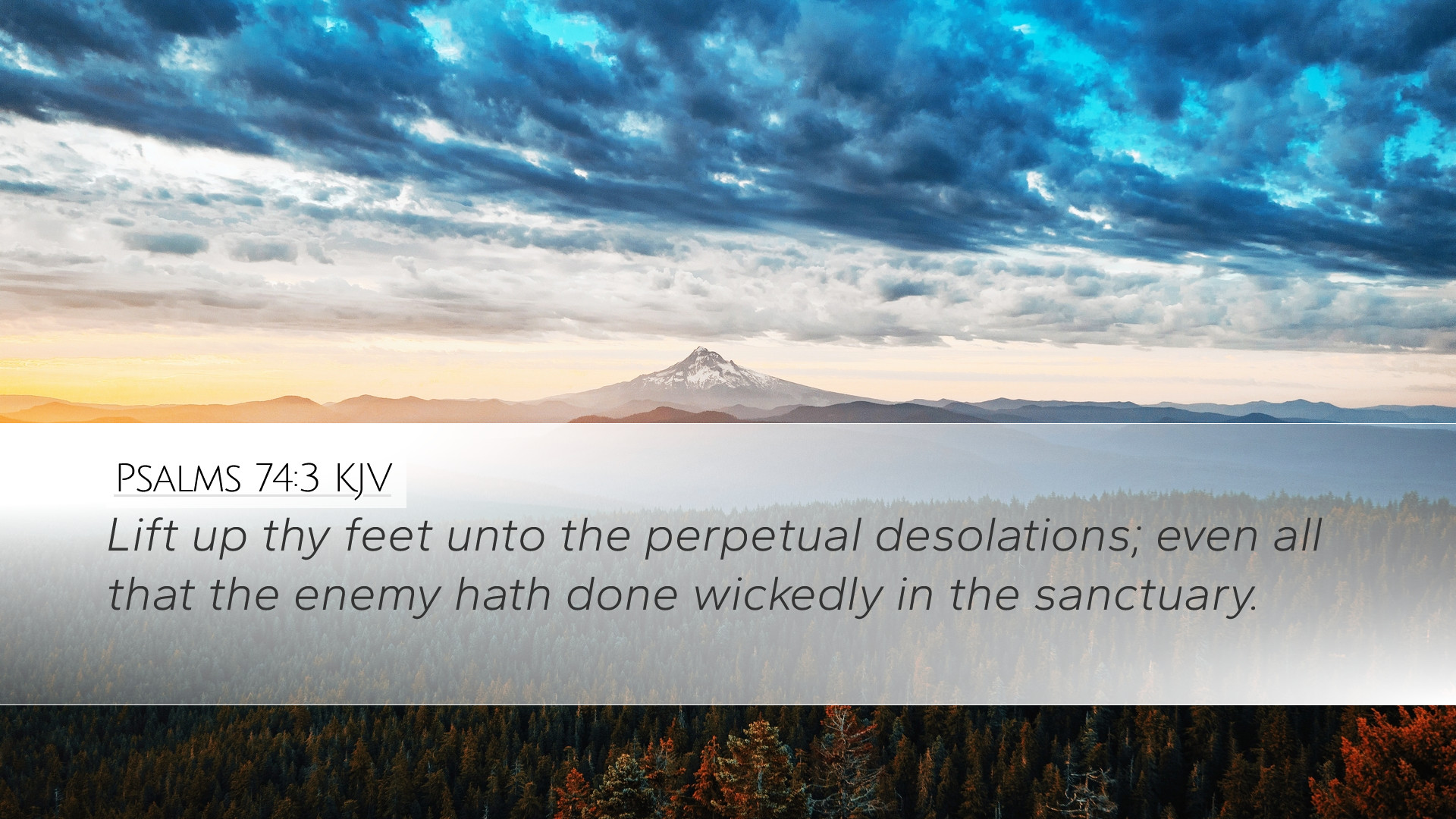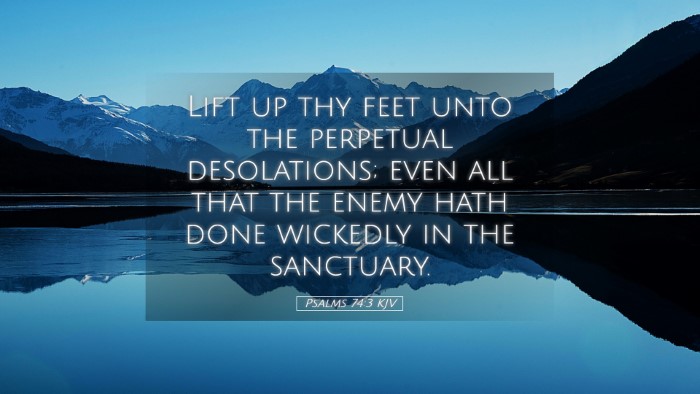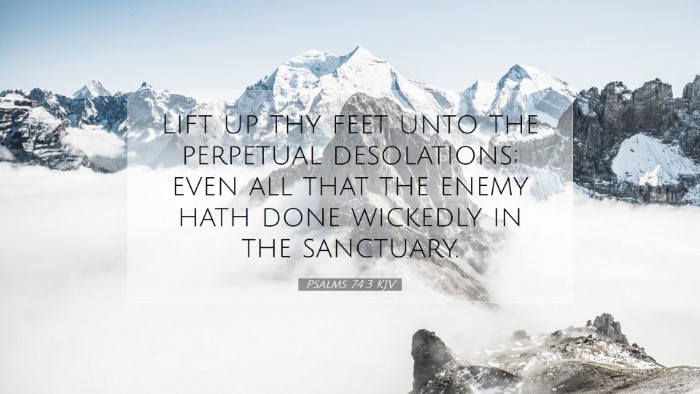Commentary on Psalms 74:3
Psalms 74:3 (KJV): "Lift up thy feet unto the perpetual desolations; even all that the enemy hath done wickedly in the sanctuary."
Introduction
The verse is set within a psalm that expresses deep lament over the destruction of the sanctuary. The psalmist earnestly petitions God to take notice of the calamity that has befallen His people, highlighting the sense of abandonment, distress, and a desperate need for divine intervention.
Contextual Background
This psalm, attributed to Asaph, reflects a period of national crisis, likely during the Babylonian exile when the temple was destroyed, and the place of worship was in ruins. The imagery of God being implored to "lift up thy feet" suggests the urgency for God to intervene and restore the desolate state of His sanctuary.
Thematic Insights
- Desolation of the Sanctuary: The sanctuary represents the physical presence of God among His people. Its destruction signifies a severe break in fellowship, highlighting the gravity of sin and rebellion among the Israelites.
- Call for Divine Intervention: The psalmist's cry is a plea for God’s attention. There is an acknowledgment of human impotence in the face of overwhelming enemy forces. This call speaks to a fundamental aspect of faith—recognizing that deliverance is solely the work of God.
- Reflection on Injustice: The phrase “even all that the enemy hath done wickedly” points to the injustices faced by the faithful. It serves as an indictment against the oppressors and a cry for God to remember His covenant with His people.
Commentary Insights
Matthew Henry's Commentary
Henry emphasizes the emotional fervor in the psalmist's prayer. He notes that the destruction of the temple not only results in loss of worship but also symbolizes the victory of the wicked. The psalmist is painfully aware of the consequences of sin and therefore grounds his request for God’s attentiveness in the historical relationship that God has with His people.
Albert Barnes' Notes
Barnes observes that the call for God to "lift up His feet" is an appeal for action, indicating that God should come to aid His afflicted people. He places the plea in the context of God’s willingness to respond to His people when they genuinely seek Him. Furthermore, Barnes notes that the perpetual desolations reflect not only current suffering but also long-lasting consequences of national sin, inviting readers to reflect on the paths that lead to such devastation.
Adam Clarke's Commentary
Clarke highlights the importance of the phrase “perpetual desolations,” indicating that the ruins were not temporary; they were indicative of a deeper spiritual reality. The historical context means that instead of focusing solely on the physical building, the psalmist laments the spiritual condition of his people and the distance from God that sin has created. Clarke encourages an understanding that God’s presence can be sought even amid seeming abandonment. The psalm calls the faithful to lament but also to hope, as God’s deliverance is always possible.
Theological Implications
- God's Justice and Sovereignty: The verse reminds believers that God is fully aware of the injustices that occur. The psalmist's prayer calls for God to act justly. This reflects a deeper understanding of God as not only able to save but also willing to restore what has been broken.
- The Role of Lament: This passage underscores the importance of lament in the life of faith. It acknowledges that distress is a reality for believers and portrays a model for bringing grievances and suffering to God.
- Hope Amid Despair: The desperate plea of the psalmist conveys the sentiment that while desolation is pronounced, it does not obscure the anticipated restoration that God can bring. The fervent call is a reminder that hope persists even in chaotic times.
Practical Applications
- Encourage Lament: Pastors and leaders can guide their congregations in expressing their sorrow and grief before God, creating space for authentic emotional expression in the face of national or personal crises.
- Remind of God’s Faithfulness: Teaching from this psalm can remind congregants of the unbroken covenant of God, fostering resilience in faith, even when situations seem dire.
- Emphasize Justice: This text encourages discussions about justice and the response of the church in the face of evil. The community can be spurred toward actions that align with biblical justice, translating feelings of disappointment into constructive community engagement.
Conclusion
Psalms 74:3 serves both as a lament and a call to action for divine intervention in periods of deep suffering. The views from the public domain commentaries by Henry, Barnes, and Clarke invite a multi-faceted spiritual reflection. Engaging with this psalm enables theologians, students, and pastors to grapple with the realities of despair while holding firmly to the hope that God is attentive to His people and active in their restoration. This exploration of scripture reminds us that in darkness, the faithful seek the light of God, trusting in His commitment to justice, mercy, and redemption.


